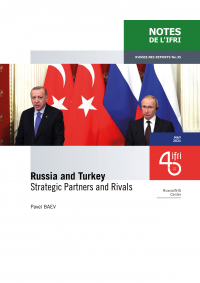
The extraordinarily troublesome year 2020 tested many international institutions and bilateral ties, but few experienced sharper challenges than the complex relations between Russia and Turkey, which have a strong impact on crisis developments in Europe’s immediate neighborhood.
Moscow can be content that Ankara is now perceived in Paris, Berlin and Washington DC as a major troublemaker, but it finds itself rather too often on the receiving end of Turkish attempts at projecting power. It was the unreserved and forceful support granted by Turkey to Azerbaijan in the war against Armenia in autumn 2020 that forced many Russian analysts to re-evaluate the status and prospects of relations with this important and difficult neighbor. There is a degree of compatibility between the autocratic political systems maturing in Russia and Turkey, but the latter state is a NATO member, while the former perceives the Atlantic Alliance as the inexorable adversary. Many drivers shaping Russian-Turkish relations, from deepening domestic discontent with corrupt authoritarian rule to the shifts in the European energy market, are outside the control of their ambitious autocrats.
This analysis will focus on the most recent and ongoing shifts in the character of this relationship. Evaluation of the key dimensions of bilateral interactions, from historical and economic to personal, is followed by an investigation of the dynamics of interplay in four key intersections: the Syrian warzone, the Black Sea area, the Libyan conflict, and the Caucasus, shaken by the new spasm of war around Nagorno Karabakh.
Pavel Baev is a Research Professor at the Peace Research Institute, Oslo (PRIO). He is also a Senior Non-Resident Fellow at the Brookings Institution, Washington DC, and an Associate Research Fellow at Ifri, Paris.
No comments:
Post a Comment